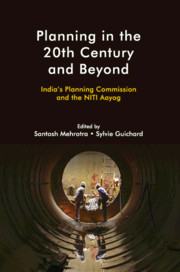Book contents
- Frontmatter
- Contents
- List of Figures
- List of Tables
- List of Abbreviations
- 1 Planning for a 21st Century India
- Part I Origins: Ideas and Ideology
- 2 From Economists to Historians: Studying the Planning Commission, 1950–2014
- 3 The Long Road to Indian Economic Planning (until 1950)
- 4 Ideas and Origins of the Planning Commission in India
- Part II Changes and Continuity: Development and Adaptation of Planning and the Planning Commission
- 5 The Planning Commission and Education
- 6 Addressing Agrarian Distress: Sops versus Development
- 7 Economic Planning after Economic Liberalization: Between Planning Commission and Think Tank NITI, 1991–2015
- 8 Planning Commission: Obiter Dictum
- 9 On a Revived Planning Commission
- Part III Planning Beyond the Planning Commission
- 10 Make in India
- 11 Manufacturing: The Cornerstone of a Planning Strategy for the 21st Century
- 12 Fiscal Planning to Sustain Growth and Poverty Reduction
- 13 Plan, but Do Not Over-plan: Lessons for NITI Aayog
- 14 Why Does India Need a Central Planning Institution in the 21st Century?
- Notes on Contributors
- Index
- References
4 - Ideas and Origins of the Planning Commission in India
Published online by Cambridge University Press: 04 April 2020
- Frontmatter
- Contents
- List of Figures
- List of Tables
- List of Abbreviations
- 1 Planning for a 21st Century India
- Part I Origins: Ideas and Ideology
- 2 From Economists to Historians: Studying the Planning Commission, 1950–2014
- 3 The Long Road to Indian Economic Planning (until 1950)
- 4 Ideas and Origins of the Planning Commission in India
- Part II Changes and Continuity: Development and Adaptation of Planning and the Planning Commission
- 5 The Planning Commission and Education
- 6 Addressing Agrarian Distress: Sops versus Development
- 7 Economic Planning after Economic Liberalization: Between Planning Commission and Think Tank NITI, 1991–2015
- 8 Planning Commission: Obiter Dictum
- 9 On a Revived Planning Commission
- Part III Planning Beyond the Planning Commission
- 10 Make in India
- 11 Manufacturing: The Cornerstone of a Planning Strategy for the 21st Century
- 12 Fiscal Planning to Sustain Growth and Poverty Reduction
- 13 Plan, but Do Not Over-plan: Lessons for NITI Aayog
- 14 Why Does India Need a Central Planning Institution in the 21st Century?
- Notes on Contributors
- Index
- References
Summary
The ideas of economists and political philosophers, both when they are right and when they are wrong are more powerful than is commonly understood. Indeed, the world is ruled by little else. Practical men, who believe themselves to be quite exempt from any intellectual influences, are usually slaves of some defunct economist.
—John Maynard KeynesIntroduction
Economic science, economic planning, and politics are deeply entwined while tracing the origins of planning in India. The purpose of this chapter is to survey the prominent ideas in the early 20th century that influenced Indian academics, intellectuals, and political leaders when the postcolonial Indian planning state began to take shape.
I discuss the central ideas in economics that gained prominence following the waning of laissez-faire economics, like Soviet-style central planning, fascism, American progressivism and institutionalism, and Fabian socialism. Related to these ideas is the changing toolkit of economists with the increasing use of mathematics and statistics. This chapter tracks these ideas and their influence on Indian intellectuals to understand the path that led to planning in India.
The Indian experience with planning in the early 20th century involves scientists, politicians, mathematicians, economics professors, theosophists, and leaders of the nationalist movement against the colonial government. I argue that the planning exercise in India can be attributed to two distinct factors. The first is the role of economic ideas in the sociopolitical movement for Indian freedom. These ideas were largely socialist leaning and created the foundation on which the economic policy of India was to be based. The second is the role of scientists and technicians who created the planning apparatus through which socialist ideas could be executed.
Laissez-faire Abandoned
Adam Smith and the 19th-century classical economists viewed the system of natural liberty as one that harmonized self-interest and social interest. Consequently, they believed in allowing the market to function with minimum control by the state. Laissez-faire economics, after the publication of The Wealth of Nations in 1776, dominated the economics profession for the next 100 years.
However, in the late 19th and early 20th centuries, faith in markets began to wane. Marx's ideas, as outlined in Das Kapital, gained popularity in Europe and ultimate recognition with the birth of the Soviet Union. Simultaneously, in the late 19th century, the United States witnessed an ideological change towards progressivism.
- Type
- Chapter
- Information
- Planning in the 20th Century and BeyondIndia's Planning Commission and the NITI Aayog, pp. 61 - 88Publisher: Cambridge University PressPrint publication year: 2020
References
- 2
- Cited by



